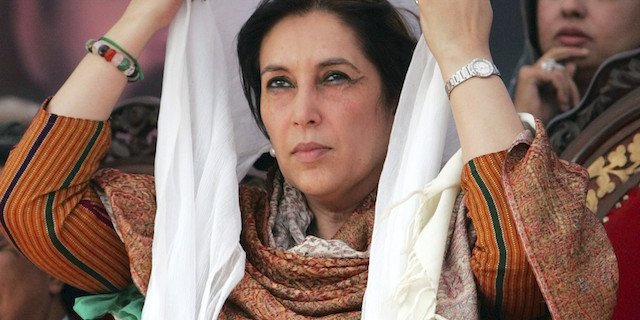
Resilience, often defined as the ability to stand up after trauma, is actually one of the more difficult faces of courage.
Once you got past the layers of involuntary charisma, the first thing one noticed about Bhutto was her everyday bravery. It was reflected both in the choices she made, not just restrictions thrust on her, but also with the state of grace she faced down what she couldn’t change in her circumstances. Her 28th birthday was spent in Sukkur jail. It was not a life she had expected, but not one she walked away from after the trauma and tragedy of Zulfikar Ali Bhutto’s arrest and judicial murder. Instead of running from the onerous responsibility of fighting an open-ended battle with a martial law regime that looked like it would not relent in its persecution of the PPP, which she began to lead, Benazir Bhutto soldiered on.
The past is not an easy country. Many of us forget the darkness and the duration of her long, lonely struggle, or don’t know about it. The nature of media is to capture the moment, the composure and poise as something burnished by privilege. The world could have been her oyster, but it was in her formative years that she became the resilient campaigner for freedoms that she was. Instead of crying about the rigours of solitary confinement she recalled how her birthday in Sukkur jail was brightened by a visit from her younger sister, Sanam, and what a privilege it was to share a few oranges allowed in, with a policewoman hovering above them scribbling notes about their conversation. The harsh incarceration without adequate medical attention left her hearing in one ear permanently impaired. She described her next months in Karachi Central Jail as equally hard, yet when some months later, given permission to go to her father’s home, for her sister’s wedding, despite her yearning to be near her ailing mother and to live outside a furnace-like jail, she did not relent. When asked to sign away her right to a political life in exchange for her freedom, she refused and went back to the damp cell with no flushing toilet, where they kept her until the end of that long, harrowing year.
After that, again, the Zia regime locked her up in Larkana, in Al-Murtaza, for another two years, with a tiny restricted list of visitors, within restricted time-slots. Many years later, when we were in house arrest together, at the hands of the Musharraf regime in Lahore in Lateef Khosa’s house, she would make light of the week spent there with new restrictions as comfortable compared to the horrors she had endured before. Little did we know that the next few weeks would strip her of her life, and Pakistan, as well as the Muslim world, of its twice-elected first woman prime minister.
The world mourned her death, and extolled her courage in standing up to hardened terrorists when few in Pakistan had even understood the importance of such resistance. Her speech at her last public rally is burned like an imprimatur on the collective memory of many who were on her journey. She shook her fist at the terrorists who had taken over the beautiful Swat valley, and promised to replace the Pakistan flag which they had tried to remove. Knowing the threat she was under, after the murderous October 18, 2007 attack, on her historic reception to Pakistan, it was typical of Benazir Bhutto to re-assess the scale of the challenge, make her decision to take responsibility for Pakistan’s principled fight, and take another step forward.
On 19th October at Bilawal House, Karachi, I was among the small team that she consulted with as she calibrated the risk to her life as very real. She did not have half the security a political leader should have had in the vanguard of an election campaign pivoting on violent extremism. General Musharraf denied it to her, hoping she would step out of the campaign but he obviously did not know her. Less than a month later, when she had gone to Dubai to see her family for the weekend, and Musharraf imposed a state of national emergency, many thought she might stay back to see what lay in store. This did not look like a free and fair fight at all. Once again, she landed at Karachi airport informing a handful of us to receive her, hoping to move on with resisting the enforced subversion of legal entitlements under the sudden Provisional Constitutional Order.
This was just one facet of the iconic Benazir Bhutto. Today, she would have been 65, in the prime of her leadership life, and politics would have taken a different turn. I hope her life can teach the rest of Pakistan some lessons in hope, courage and leadership. Her son, Bilawal Bhutto Zardari, thrust into his position much like she was, has a long career before him. Pakistan needs his unequivocal voice of inclusion and tolerance for diversity. His message too can be transformative in a region divided by violent binaries.
Published in The Express Tribune, June 21st, 2018.
Like Opinion & Editorial on Facebook, follow @ETOpEd on Twitter to receive all updates on all our daily pieces.


1731637727-0/Bear--(1)1731637727-0-165x106.webp)

1731619853-0/ice-cream-(1)1731619853-0-165x106.webp)







COMMENTS (1)
Comments are moderated and generally will be posted if they are on-topic and not abusive.
For more information, please see our Comments FAQ